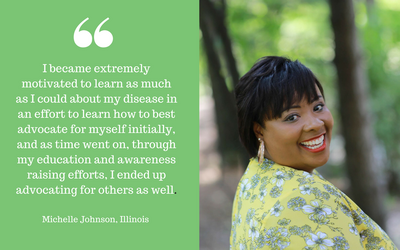
A: I first became involved in advocacy work a few years after my own diagnosis with stage 4 endometriosis in 2008, and later with severe diffuse adenomyosis. Despite the fact that these diseases had been around for a long time, not much was known about endometriosis by patients and doctors. Even after my initial diagnosis and first few surgeries, I realized how little I knew. I became extremely motivated to learn as much as I could about my disease in an effort to learn how to best advocate for myself initially, and as time went on, through my education and awareness raising efforts, I ended up advocating for others as well.
Q: When did you first begin experiencing chronic disease symptoms, and how did you feel after receiving your initial diagnosis?A: I began experiencing symptoms around age 16; however, I wasn't diagnosed until age 33. After receiving my initial diagnosis, I was overwhelmed, confused, angry and scared. I had no idea what this diagnosis meant, or how it would affect my life and change me as a person
Q: What inspires you?A: Whenever I get feedback from women who say that information from my website, book or one of my seminars has helped them to better understand their diagnosis or helped them to feel less alone. Even when someone shares that while they don't have the disease themselves, they now have a better understanding of what a friend, sister, cousin, wife or co-worker goes through – these are the things that inspire me to keep pushing forward in my advocacy, especially on the days when I feel like giving up.
Q: What is one piece of advice you would offer to others who are battling a chronic disease?A: I would encourage anyone battling a chronic disease to first educate, enlighten and empower yourself as much as possible. I would suggest educating yourself and learning as much as you can about your disease outside of information and pamphlets given to you at a doctor’s office. I learned so much more about my disease through self-advocacy and research than I ever received from most of the doctors that I sought treatment from.
Secondly, connect to a support network with others facing your same battle - online support groups can be great for this.
Lastly, do not be afraid to speak up and speak out on your own behalf. Be your own advocate and feel empowered to seek a second (or third, or fourth) opinion, or to “fire” a doctor that is not a good fit for you. Do not be afraid to seek alternative treatment options, or to refuse treatment options that you are not comfortable with or fully informed about. Be sure your treatment plan is one that fits best with your personal, professional and medical goals. Remember, your doctor works for you!
Q: How do you balance staying active while making sure that you don’t overdo it?A: I listen to my body and shorten my “to do” list. There are days when I can push past tired and go from sun up to sun down, but there are days where I have to stop after one or two activities and rest or sleep for the remainder of the day. When I first wake up, I gauge how I'm feeling and adjust accordingly. I've learned to restrict my task list to no more than five items for the day, focusing of the top three that absolutely must be done. If I hit all three, great. If I don't, that's OK too. I've also gotten very comfortable with the word "no." I no longer feel guilty about saying no to people, plans or projects that do not serve my well-being on any given day. By saying no to those things, I am saying yes to my own self-care and healing.